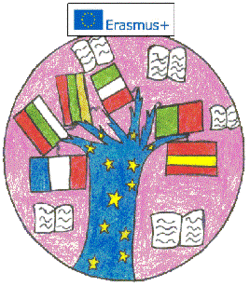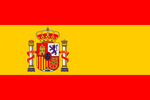-
-
-
-
Par EramusBolano le 3 Avril 2018 à 22:28
 se cliccate sulla scritta sotto appare il sito del progetto con tutte le bandiere che collegano ai blog dei diversi Paesi
se cliccate sulla scritta sotto appare il sito del progetto con tutte le bandiere che collegano ai blog dei diversi Paesi
-
Par EramusBolano le 13 Octobre 2017 à 23:13
Six pre-schools and primary schools (from Spain, Italy, Bulgaria, Lithuania, Portugal and France) will help with their own experience to provide new methodologies and to make the competencies more efficient in order to implement a work based in projects:
The European reference framework (Strategies «Europe 2020») has achieved a consensus regarding the objectives of the European educational systems: our students need to achieve the core competences at the end of their mandatory education so as to evolve efficiently in a constantly changing society and to build a participatory and democratic future. These are THE KEY COMPETENCES. The competency-based approach consists of a learning that is more specific, more active and more durable. This is one of the key elements of the current reforms, which aim to adapt the schools to the needs of our time.
This new European educational movement is ACCOMPANIED by the need of a methodological change within the different schools that take part in this partnership. The necessity for these changes is linked to the loss of motivation and the low academic performance of the students, which is visible, in a way, thanks to the indicators, the evaluations and the reports conducted in different educational levels.
Furthermore, even if the different schools of the partnership are already familiarized with the teaching skills of the projects and the competency-based teaching, they feel the need to renew their practices and to spread them more widely specially to all the new teachers joining their teams each year. For all these reasons, we would like to share our innovative practices and implement new learning methodologies in our classes so as to make a significant improvement in the results and the motivation of our students. These changes in our practices will have a great impact on the whole educating community.
Therefore, we want to develop a project that relies on a COMPETENCY-BASED LEARNING THROUGH PROJECT-ORIENTED WORKS in pre-schools and primary schools.
In order to optimize the competency-based learning, it is necessary to implement new active and contextualized methodologies. These will ease the participation and involvement of our students and the acquisition and usage of knowledge in real situations, as well as generate new durable and transferable learning processes.
Interactive strategies are more appropriate in competency-based learning processes, since they allow us to share and build knowledge and to stimulate the classes through a verbal exchange and collective ideas. Regarding to methodology, the WORK PROJECTS can be an answer to the development of basic competences in pre-schools and primary schools.
The key idea of our project is that the academic success in children requires a collaboration of all those who care about their learning process. They need to learn to get to know themselves better and to value their own competences.
We want to face the challenge of a pre-school and a primary school in partnership with families and colleagues, within a team of motivated educational teams.
During the life cycle of the project, the work will be oriented through the acquisition of enough knowledge so as to allow the practical application of the PROJECT-ORIENTED work and different stunning and innovative methodologies in order to work on the KEY COMPETENCIES in a different way. Within the two-year life cycle of the project, the efforts will also be focused on a PROJECT-ORIENTED METHODOLOGY OF THE WORK. This will put into practice all the knowledge on the key competences to complete successfully this new methodology. Four shared working projects will be undertaken in the engaged schools (two in pre-school and two more in primary school) and four projects of free choice (two in pre-school and two in primary school) will also be undertaken during the two-year life cycle of the project. This project-oriented work will lead to the progressive suppression of textbooks, since it will be the teachers, together with the students, the ones shaping the projects of the future. Moreover, these practices will have an impact on the whole educational community.
-
Par EramusBolano le 8 Octobre 2017 à 03:13
Sei Istituti scolastici europei lavoreranno insieme per apprendere nuove metodologie, rendere più efficace lo sviluppo delle competenze e per attuare la didattica per progetti.
I Paesi coinvolti sono: Spagna, Bulgaria, Italia, Francia, Lituania e Portogallo
Nell'ambito delle indicazioni europee (Strategie "2020") è stato da tempo raggiunto un consenso sugli obiettivi dei sistemi di istruzione: i nostri studenti dovrebbero raggiungere, entro la fine della scuola dell'obbligo, le competenze fondamentali per affrontare in modo adeguato una società che cambia e costruirsi un avvenire partecipativo e democratico; si tratta delle “COMPETENZE CHIAVE”. L'approccio della didattica per competenze è finalizzato a perseguire un apprendimento più concreto, più attivo e più duraturo: si tratta di un elemento basilare delle riforme scolastiche degli ultimi anni per adeguare la scuola alle esigenze del nostro tempo.
Per ottimizzare l'apprendimento per competenze, è necessario implementare metodologie attive e contestualizzate che possano facilitare la partecipazione e il coinvolgimento degli allievi, l'acquisizione e l'uso della conoscenza in situazioni di vita reale, generando apprendimenti sostenibili e trasferibili; il tutto, all'interno di team docenti motivato e aggiornato.
Questa necessità educativa, unitamente alla necessità di un cambiamento a livello metodologico, è legata alla mancanza di motivazione e al basso rendimento scolastico, in alcuni ambiti, degli studenti, evidenziati dalle indagini valutative e dai bilanci condotti nei diversi livelli di istruzione.
Nel corso dei due anni di attività, il lavoro dei Paesi partner sarà focalizzato sul LAVORO PER PROGETTI, : saranno sviluppati quattro progetti di lavoro comuni a tutte le scuole partecipanti (due all’infanzia e due alla primaria) e quattro progetti liberamente scelti da ogni istituto (sempre due progetti per l’infanzia e due per la primaria). L’intenzione è quella di condividere pratiche innovative e generare esperienze significative, attraverso un percorso basato, come indica il titolo originale del progetto sullo " SVILUPPO DELLE COMPETENZE ATTRAVERSO UN LAVORO BASATO SUI PROGETTI".
Il lavoro del progetto indurrà la graduale soppressione dei libri di testo e saranno gli insegnanti, in collaborazione con gli studenti, che determineranno i progetti futuri.
-
Programma Erasmus+ ISA 20 BOLANO 2017-1-ES01-KA219-037870_3























